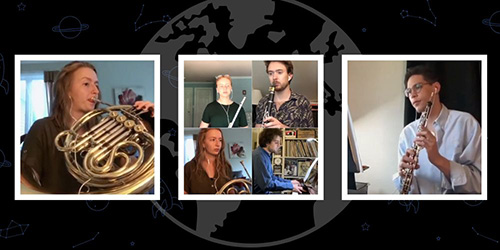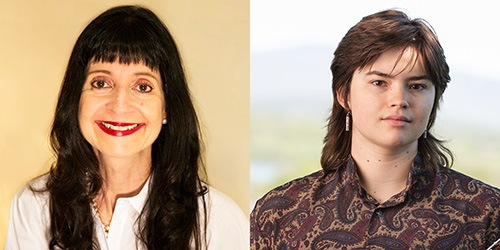This month on Planet Classroom, the Bard College Conservatory of Music performs Francis Poulenc’s Sextet II: Divertissement in a warm, witty rendition. The performance features talented musicians from the Bard Conservatory: Monika Dziubelski on flute, Nathaniel Sanchez on oboe, Collin Lewis on clarinet, Chloe Brill on bassoon, Natalia Dziubelski on French horn, and Leonard Gurevich on piano.
This talented ensemble brings Poulenc’s humor and whimsy to life, taking audiences on a lively, captivating journey through music, reminiscent of the playful charm of silent films.
全球搜索教育 is pleased to welcome musician Chloe Brill.
Chloe, as a bassoonist, were there specific sections in Poulenc’s Sextet II that resonated with you or challenged your technique in unique ways? Could you share how you approached these moments?
When I played this piece, I was a freshman, and it was my first time performing in a classical chamber group. 因為這, I found the most challenging aspects were those that required very attentive listening to blend and balance the bassoon with other instruments. 例如, at rehearsal 1 in the score, as well as the last two measures of the second movement, the bassoon and the flute play together in unison, quietly. It was an important challenge that strengthened my overall playing—to figure out how to blend, not overpower, but also not disappear.
Poulenc’s composition is known for its playful, cinematic qualities. How did you experience this energy as you performed, and were there moments where you felt the bassoon’s role added a distinct character to the piece?
The playful character of the second movement in Poulenc’s Sextet is really exemplified by the bassoon with the trills that follow the tempo change. They create forward momentum and add texture, shifting the tone from a lamenting, pensive mood to something more cinematic and whimsical, almost like a windy scene in a film.
Rehearsing and performing with such a talented ensemble must have had its memorable moments. Could you share an instance during rehearsals or the performance that stood out for you and brought the music to life?
There was a moment in rehearsal where we had a very in-depth conversation about dynamics. I argued for adding more dynamic contrast, while the oboe player felt that Poulenc would have written it if he wanted it. 老實說, I don’t remember what we ultimately decided, but I remember feeling passionate about discussing both the music and the composer’s intentions. I loved that our understanding of the piece was still evolving—that there were still things to figure out.
What message or feeling do you hope audiences connected with through this performance, especially from the perspective of the bassoon’s contribution to the overall texture and mood of Poulenc’s work?
I hope the audience connects with the scenes this piece creates. Each movement feels like a vignette, filled with somber, funny, and intense moments. The bassoon often serves as a mechanism to shift the scene, especially in the transitional sections, which adds depth and variety to the texture and mood throughout the work.
謝謝, Chloe!
ç. M. Rubin with Chloe Brill
不要錯過 Francis Poulenc’s Sextet II: Divertissement, 現已在星球課堂網路上直播. This performance is curated by Bard College Conservatory.







最新評論